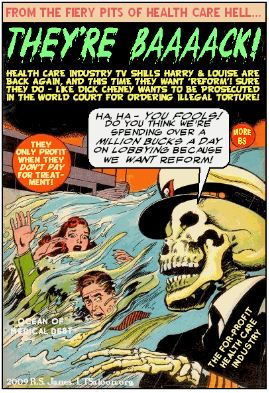
(Remember Harry and Louise? Concerned Citizens at the breakfast table.)
Virginia Attorney General Ken Cuccinelli sent me a nice note this morning. Well, better said, his gubernatorial campaign sent me a note about the first day of hearings in front of the Supremes on the Affordable Health Care thing.
The Virginia Governor is a term-limited position- the Old Dominion is unique in prohibiting its chief executive from succeeding himself, though the incumbent is free to run again for the office after four years out of the executive mansion. Accordingly, we have a long line of politicians using the gubernatorial post as a sort of gateway drug to something else.
Cuccinelli was in court for the opening day, and his campaign is using his notes of the proceedings as a commentary on his view of government. The current Republican governor, Bob MacDonald, is still smarting from the backlash over the antics of his co-party legislators on women’s reproductive rights. He had to back-pedal pretty hard when it was revealed exactly what the new pre-abortion screening process was going to entail, and he is obviously looking forward to his net elected position, as is his Attorney General, who is a high-profile litigator in all sorts of things that would not readily jump to mind.
It is sort of like when Mr. Obama came to Washington amid the economic melt-down, through $800 Billion out the windows of the White House to follow Mr. Bush’s $700 Billion bail-out and declared the number one issue before the reeling United States to be…
Yeah, Health Care. You might want to look up Ken’s commentary on Day One, since it outlines one of the aspects in which the largely un-read and weirdly structured legislation is based. I found the full text on a Tea Party site, not that I endorse it, but they posted it in full, and it is worth a read, with a grain of salt, since it is part of the framing of his political campaign.
http://www.richmondteaparty.com/2012/03/supreme-court-healthcare-hearing-day-1-summary/
I take all of these guys with at least a grain of salt, if not a full handful. That goes for the other side on this thing as well. I am deeply troubled by the notion that the government is about to mandate my purchase of asparagus and whether or not I eat my broccoli. Or something. But the issues are indeed interesting, and if you don’t follow them, well, be prepared for all sorts of exciting new mandates from people who seem very comfortable in telling you what you must (or may not) purchase in the marketplace.
When is a penalty a tax, and what is a tax, anyway? That was the subject of Day One in a nutshell, but I was out in front of that, favoring a single payer system, and that got some folks all riled up. The Justices are doing this the methodical way. They heard first things first, and that starts with the Anti-Injunction Law and the argument about whether “penalties” for not buying health insurance should be considered a “tax.”
If they are a tax, the law says arguments against them can’t be heard until they are actually paid, effectively meaning the whole case on the constitutionality of the law would have to be postponed.
The internet was out at Big Pink when I got up and hobbled back to the kitchen for coffee and then plopped down at the dining table to find out what had happened overnight. “Crap,” I said, as the long queue of messages appeared, flickered, and was gone. I won’t trouble you with my wifi challenges- my base station has lost its encryption and needs replacement- and hence, I had to go down to the editorial offices of The Daily at Socotra House to log on.
There was a knot of people out front with signs and surly attitudes. The building had been egged, and some scruffy-looking folks threatened to block access to my place of business, or opinion, as the case may be. When is the exercise of free speech an act of intimidation? It all depends on what office you are trying to get into.
Anyway, I did get a chance to read Mr. Cuccinelli’s opinion, and had a mildly positive view of the Supremes when I got done. To continue Associate Justice Thomas’s basketball analogy of a few weeks ago, there appeared to be no “slam dunks,” in the arguments.
Today is supposed to be the big day, and we will just have to see how that goes down.
But as to the protests about the whole single-payer thing, I think it is useful to look back and see how we got to the place we are, with most people’s health care provided in symbiosis with their employers, and whether or not that arrangement is enshrined in the Constitution.
It is not, of course. In fact, it is one of those legacies of chance and circumstance that defines our patchwork Republic.
There was no such concept as “health insurance” when the founding documents of the nation were drafted, much less the idea that such a thing might be an inalienable right. The first “accident insurance” did not appear until 1850, and offered a chance to purchase protection against injuries suffered in railroad and steamboat accidents. Competition- a feature much sought after to incentivize competitive pricing- soon was a fixture of the new industry with over sixty companies offering insurance policies by the end of the Civil War. Think, for a moment, of the number of veterans with grave injuries (suffered for the nation, or against it) which would necessarily be considered “pre-existing conditions.”
Boggles the mind. That whole generation had largely passed away by the time the first experiment in a disability policy was issues in 1911, but the orientation was not on medical coverage, but rather covering lost wages, since everyone was expected to pay for the Doctor’s services on an out-of-pocket basis, or what we call now the fee-for-service business model.
The orthopedic Surgeon up the road from Bib Pink was happy to offer me that option last week when I could not walk, and was not entirely sure I could navigate myself to my primary care physician over in Bethesda.
Hospital and medical expense policies were introduced during the first half of the 20th century. During the 1920s, individual hospitals began offering services to individuals on a pre-paid basis, eventually leading to the development of the Blue Cross organizations after the Great Depression started in 1929.
That is the deal here- Blue Cross was a private deal, between the company and the insured. I heard some muttering in the crowd that it was Socialism, and that it could not be countenanced. That got me going. I despise Socialism and Socialists, for that matter, and their resurgence after the fall of Communism is something that I look at in baffled wonder. I mean, it didn’t work for Russia or the Soviet Bloc, so why do they think it will work this time?
But I have to say, we got a sort of Socialism with the New Deal, and people have been bitching about it ever since.
Here is my point about all that. The Roosevelt Administration is directly responsible for the system we have now. Blue Cross before World War II was a private deal, though it could be encouraged by a partnership with Industry. With the titanic mobilization of just about everything to destroy Fascism, wage controls were put in place to ensure there was stability in the skilled work-force, and people could not hop from job to job, effectively making themselves small-scale war profiteers, something that was once considered bad form.
As I have often told my sons, when they would listen, that the value of labor is the key to understanding politics. The War made the labor market tight due to the increased demand for goods and decreased supply of workers during the war. Federally imposed wage and price controls prohibited manufacturers and other employers raising wages high enough to attract sufficient workers.
The major tipping point was an exercise in social control by Washington: the War Labor Board, an unelected (but quite efficient) group determined that fringe benefits (including sick leave and health insurance) did not have to be counted as “ordinary income” for the purposes of wage controls, employers responded with significantly increased benefits. Unions have been negotiating contracts on that basis ever since- and hence the “cadillac” health plans of which people are so fond.
Voila! Between 1940 and 1950, the total number of people enrolled in health insurance plans grew from 20,662,000 to 142,334,000. By 1958, 75% of Americans had some form of health coverage.
I could hear eggs hitting the side of the building with dull thuds. When I looked out the window, I could see some people putting up tents in the square across the street. I opened the window and shouted down: “Hey, it already is socialism! It always has been- it is a relic!”
I plopped down on the ergonometric chair by the big walnut desk and sighed. “If only Bush had made it possible for the VA to negotiate the price of drugs, then maybe Medicare Part B would not have been just a ruse to provide vast profits to Big Pharm.”
I lit up a Lucky, thinking that the risk factor would probably make me ineligible for most surgical procedures under the new Affordable Care Act and the rationing of services that is inevitable in a vastly expanded public health care system. Of course it is socialism, I thought.
But it already is.
“Shoot,” I muttered. “Every President has struggled with this one, from harry Truman on down. Dick Nixon slugged it out with that windbag Ted Kennedy about it. Fat Ted wanted a single payer system, and Tricky Dick countered with a proposal based on mandates and incentives for employers to provide coverage while simultaneously expanding publicly-run coverage for low-wage workers and the unemployed.
That hybrid system might have worked, but Watergate got in the way, and the Oil Shock and all the rest of the disasters of the 70s. Clinton tried it, too, as we all recall. Remember Harry and Louise and their concern that the government would come between them and their physician? Shoot, the government has been there for seventy years. The question is what kind of socialism you want, or better said, what we will put up with.
That is why day two at the Supreme Court is going to be interesting. Or at least one of the reasons. I just want those people to get away from my door. My leg hurts, but I guess that doesn’t matter.
The Doctor doesn’t make house calls anymore anyway.

Copyright 2012 Vic Socotra
www.vicsocotra.com
